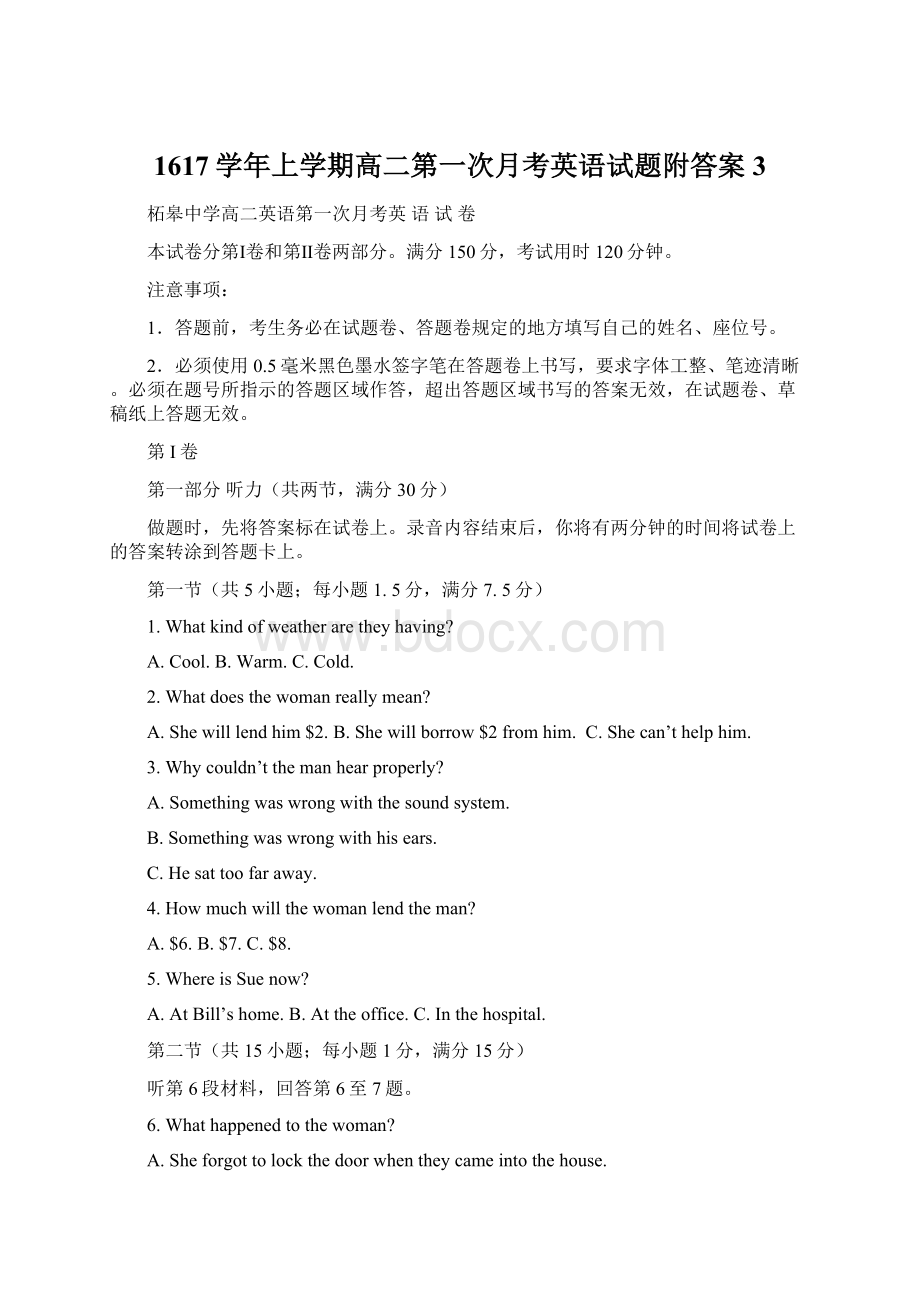1617学年上学期高二第一次月考英语试题附答案3Word文档格式.docx
《1617学年上学期高二第一次月考英语试题附答案3Word文档格式.docx》由会员分享,可在线阅读,更多相关《1617学年上学期高二第一次月考英语试题附答案3Word文档格式.docx(11页珍藏版)》请在冰豆网上搜索。

A.Shewilllendhim$2.B.Shewillborrow$2fromhim.C.Shecan’thelphim.
3.Whycouldn’tthemanhearproperly?
A.Somethingwaswrongwiththesoundsystem.
B.Somethingwaswrongwithhisears.
C.Hesattoofaraway.
4.Howmuchwillthewomanlendtheman?
A.$6.B.$7.C.$8.
5.WhereisSuenow?
A.AtBill’shome.B.Attheoffice.C.Inthehospital.
第二节(共15小题;
每小题1分,满分15分)
听第6段材料,回答第6至7题。
6.Whathappenedtothewoman?
A.Sheforgottolockthedoorwhentheycameintothehouse.
B.Shedidn’tlockthedoorwhentheylefthome.
C.Shefoundherlockstolen.
7.Whatwouldtheydoafterwards?
A.They’dgobackhomequickly.
B.They’dgobacktobuyapackofcigarettesfirst.
C.They’dlockthedoor.
听第7段材料,回答第8至9题。
8.Whereisthemanprobablygoing?
A.Tovisitafriend.B.Togotoagarden.C.Todosomeshopping.
9.Whenisthemanprobablycomingback?
A.Earlierthan11:
30.B.Bymidnight.C.Laterthanmidnight.
听第8段材料,回答第10至12题。
10.Wherearetheconversationprobablytakingplace?
A.Intheoffice.B.Atschool.C.Athome.
11.Howmanykidsdoesthewomanhave?
A.Two.B.There.C.Four.
12.WhereisBill?
A.Inhisownroom.B.Inthekitchen.C.Attheswimmingpool.
听第9段材料,回答第13至16题。
13.Wheredidtheconversationtakeplace?
A.Atthebirthdayparty.B.Atabank.C.Atastore.
14.Whydidthemanwanttoreturnhisjacket?
A.Becausehewearssize10,butit’ssize8.
B.Becausehewearssize8,butit’ssize10.
C.Becausehewearssize11,butit’ssize8.
15.Whydidhegetthewrongsize?
A.Becausehedidn’ttryitonwhenheboughtit.
B.Becausehisauntwasnotsureabouthissize.
C.Becauseheh.adgrownafterhegotit.
16.Whatwillthemanprobablydo?
A.Hewilltakeawhiteoneinsize10.
B.Hewilltakearedoneinsize10.
C.Hewilltakeabrownoneinsize10
听第10段材料,回答第17至20题。
17.Whatdidn’tpeopleknowmanycenturiesago?
A.Howtohuntanimals.B.Howtogathergoods.C.Howtofarm.
18.WhichofthefollowingistruetotheKooris?
A.Theyliveinplacesthatareeasytoreach.
B.Theyhaven’tlearnedwaysofdoingthingsfromothers.
C.Theyhavemetquiteafewoutsiders.
19.WhatdotheKoorisdomostoftheirtime?
A.LookingforfoodB.Raisinganimalsforfood.C.Searchingforseedsandnuts.
20.WheredotheKoorissleepatnight?
A.Inthehouses.B.Aroundfires.C.Theydon’tsleepatallastheyhavenohouses.
第Ⅱ卷
第二部分阅读理解(共两节,满分40分)
第一节(共15小题;
每小题2分,满分30分)
阅读下列短文,从每篇短文后所给各题的四个选项(ABC和D)中,选出最佳选项。
A
Manypeoplesaythattheyareworkingtoomanyhours.Theydon'
thaveenoughtimetorelaxortostaywiththeirfamily.
Workhoursaredifferentfromonecountrytoanother.InFrance,peoplespendabout1,646hoursayearatwork.InJapan,however,peopleworkabout2,159hoursayear.ThatmeansaJapaneseworkerworks513morehoursayearthanaFrenchworker.
Whydopeopleworksomanyhours?
Somepeopleworkextrahoursbecausetheywanttomakemoremoney.However,manycompaniesdon'
tpayovertime.Theirworkersdon'
tgetmorepayformorework.Somepeoplethinkit'
stheirdutytoworkmorehours.Someareafraidoflosingtheirjobsiftheydon'
tworkmorehours.
Manypeoplesaythattheirvacationsaretooshort.InFrance,peoplegetfiveweeksofpaidvacationayear.InGermany,theygetfourtosixweeks,andintheUnitedStates,twoweeks.Onestudyshowsfewerthanhalfofworkersusedalltheirvacationdays.InGreatBritain,thereisasaying,"
AllworkandnoplaymakesJackadull(迟钝的)boy."
Ifthatistrue,theremustbealotofdullpeopleintheworld.
21.AJapaneseworkerworks__morehoursayearthanaFrenchone.
A.513B.1,646C.2,159D.3,805
22.Peoplein________getonlytwoweeksofpaidvacationayear.
A.FranceB.theUnitedStatesC.GermanyD.GreatBritain
23.Whichofthefollowingistrueaccordingtothepassage?
A.Nocompaniesoffervacationstotheirworkers.
B.Manypeoplesaytheyhaveenoughtimetorelax.
C.Morethanhalfofworkersusealltheirvacationdays.
D.Notallcompaniespaytheirworkersformorework.
24.Whatcanweinferfromthepassage?
A.Manyworkershavetoworklonghours.
B.Manypeoplehavevacationslongenough.
C.Workhoursarethesamearoundtheworld.
D.Therearealotofdullpeopleintheworld.
B
Mostpeoplearoundtheworldareright-handed.Thisalsoseemstobetrueinhistory.In1997,scientistsstudiedworks(作品)ofartmadeatdifferenttimesfrom15,000B.C.tothe1950s.Mostofthepeopleshownintheseworksareright-handed,sothescientistsguessedthatright-handednesshasalwaysbeencommonthroughhistory.Today,onlyabout10%to15%oftheworld'
spopulationisleft-handed.
Whyaretheremoreright-handedpeoplethanleft-handedones?
Scientistsnowknowthataperson'
stwohandseachhavetheirownjobs.Formostpeople,thelefthandisusedtofindthingsorholdthings.Therighthandisusedtoworkwiththings.Thisisbecauseofthedifferentworkofthetwosidesofthebrain(大脑).Therightsideofthebrain,whichmakesaperson'
shandsandeyesworktogether,controlsthelefthand.Theleft-sideofthebrain,whichcontrolstherighthand,isthecenterforthinkinganddoingproblems.Thesefindingsshowthatmoreartistsshouldbeleft-handed,andstudieshavefoundthatleft-handednessistwiceascommonamongartiststhanamongpeopleinotherjobs.
Noonereallyknowswhatmakesapersonbecomeright-handedinsteadofleft-handed.Scientistshavefoundthatalmost40%ofthepeoplebecomeleft-handedbecausetheirmainbrainisdamaged(损害)whentheyareborn.However,thisdoesn'
thappentoeveryone,soscientistsguesstheremustbeanotherreason(原因),whypeoplebecomeleft-handed.Oneideaisthatpeopleusuallygetright-handedfromtheirparents.Ifapersondoesnotreceivethegene(基因)forright-handedness,he/shemaybecomeeitherrightorleft-handedaccordingtothechance(偶然性)andthepeopletheyworkorlivewith.
Thoughright-handednessismorecommonthanleft-handedness,peoplenolongerthinkleft-handedpeoplearestrangeorunusual.Alongtimeago,left-handedchildrenweremadetousetheirrighthandslikeotherchildren,buttodaytheydon'
thaveto.
25.Afterstudyingworksofartmadeatdifferenttimesinhistory,thescientistsfound________.
A.theartbeganfrom1500B.C.
B.theworksofartendedinthe1950s
C.mostpeopleshownintheworksofartareright-handed
D.mostpeopleshownintheworksofartareleft-handed
26.Howmanypeopleintheworldareleft-handednow?
A.Morethanahalf.
B.Lessthanonesixth.
C.About40%.
D.Thepassagedoesn'
ttellus.
27.Whatisthelefthandformostpeopleusedtodo?
A.It'
susedtomakeaperson'
seyesworktogether.
B.It'
sthecenterforthinkinganddoingproblems.
C.It'
susedtoworkwiththings.
D.It'
susedtofindorholdthings.
C
Lookaroundandyou’llseepeoplebusyontheirsmartphones.Smartphonesdomakeourliveseasier.Buthaveyoueverthoughtaboutwhattheymeantoyoureyes
Accordingtoastudy,halfofBritishpeopleownsmartphonesandtheyspendanaverageoftwohoursadayusingthem.Therehasbeena35%increaseinthenumberofpeopleintheUKwhosufferfromshortsightedness(近视)sincesmartphoneswereintroducedtherein1997.
Staringatsmartphonesforlongtimegivesyoudryeyes.Whenlookingatsomethinginthedistance,youreyesautomaticallyblink(自动眨眼)acertainnumberoftimes.However,whenyoulookatthingsclosertoyourface,theblinkingslowsdown.Thisreducestheamountoftearsandcausesdiscomfortinyoureyes.Anotherbadhabitisusingsmartphonesindarkroomsbeforegoingtosleep.Ifyoulookatabrightscreenwhileyourpupils(瞳孔)becomelarger,toomuchlightentersyoureyes.Thiscandoharmtotheeyesandcauseadiseasecalledglaucoma(青光眼).
Whileyou’reprobablynotgoingtostopusingtoyoursmartphone,thereareafewthingsyoucandotoprotectyoureyes.Holdyourphoneatleast30centimetersawayfromyoureyeswhenusingit.Takeabreakeveryhourandtrythefollowing:
lookatsomethingatleastfivemetersfromyouandthenfocusonthetipofyournose.Repeatthisseveraltimes.Itshouldreducethediscomfortinyoureyes.
28.Thearticleismainlyabout________.
A.theharmthatsmartphonesdotousers’eyes
B.therulestoobeywhenusingsmartphones
C.thereasonwhyteenagersgetshortsightedness
D.advantagesanddisadvantagesofsmartphones
29.FromParagraph2,welearnthat_______.
A.halfoftheBritishpeoplebegantosmartphones17yearsago
B.eachoftheBritishpeoplespendstwohoursadayonsmartphones
C.moreBritishpeoplehavegotshortsightednesssince1997
D.thenumberofBritishpeoplewhoownsmartphonesincreasesby35%
30.AccordingtoParagraph3,usingsmartphoneimproperlymaycause____
A.toomanyblinksB.dryeyesandglaucoma
C.smallerpupilsD.moretearsintheeyes
31.Thisarticleiswrittentoadvisepeople____
A.nottobuysmartphone
B.tostopusingsmartphone
C.tomakefulluseofsmartphone
D.tousesmartphoneproperly
D
Inajobinterview,thefirstquestionisoftena"
breakingtheice"
typeofquestion.Donˊtbesurprisediftheinterviewerasksyousomethinglike:
“Howareyoutoday?
”or“Whatdoyouthinkoftheweatherlately?
"
A